| Srl | Item |
| 1 |
ID:
123068


|
|
|
|
|
| Publication |
2013.
|
| Summary/Abstract |
Long known as innovative in modernist architecture, mid century Ahmedabad was also pioneering in another area of built form: housing. Starting in the 1920s when Indians seized control of urban politics, Ahmedabadis launched a number of bold new initiatives to improve housing in the city, involving a striking range of actors-labour activists, middle-class reformers, mill owners, and municipal leaders. Largely ignored under earlier British leadership, housing became a key way for Ahmedabadis to lay claim to a new, more inclusive vision of the city. Although housing continued to play a prominent role in politics after Independence, the 1950s actually marked a retreat from that earlier inclusive vision, ultimately enshrining the class and community segregation that marks Ahmedabad today.
|
|
|
|
|
|
|
|
|
|
|
|
|
|
|
|
| 2 |
ID:
124246
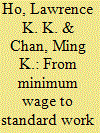

|
|
|
|
|
| Publication |
2013.
|
| Summary/Abstract |
This paper aims to highlight the significance of labour issues - namely, the minimum wage (MW) and standard working hours (SWH) - in shaping candidates' electoral platforms in the 2012 chief executive (CE) election of the Hong Kong Special Administrative Region (HKSAR) under the sovereignty of the People's Republic of China (PRC). We first offer a brief review of labour politics regarding the MW case as a precursor to the SWH drafting and enactment process. We then provide an analytical delineation of some of the labour and socio-economic dimensions of the CE electoral contest by comparing the candidates' campaign planks in relation to SWH. We then attempt to predict the likely course of the SWH debate under the leadership of Leung Chun-ying, who eventually won the CE election and assumed power on 1 July 2012. We conclude by examining Leung's social engineering attempts to increase popular support amongst low- and middle-income (LMI) households as part of his long-term strategy for the 2017 CE elections and his broader Beijing-entrusted political agenda.
|
|
|
|
|
|
|
|
|
|
|
|
|
|
|
|
| 3 |
ID:
175163
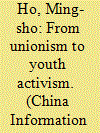

|
|
|
|
|
| Summary/Abstract |
This article examines two major protests related to working-hour reforms in Taiwan in 2000 and 2016–18, paying particular attention to the shift in the composition of protesters from union members to youth activists. The decline in mass membership and the failure to consolidate a national federation have diminished the political presence of labour unions. The emergence of youth protest movements, both before and after the 2014 Sunflower Movement, made possible the advent of Taiwan’s youth as political actors. The reconfiguration of Taiwan’s working hour politics has paralleled the global transition from the classical organization-based collective action to the digitally enabled ‘connective action’. The concluding section provides reflections on the impacts as well as the limitations of this newer form of labour politics.
|
|
|
|
|
|
|
|
|
|
|
|
|
|
|
|
| 4 |
ID:
087021
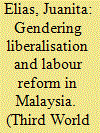

|
|
|
|
|
| Publication |
2009.
|
| Summary/Abstract |
This paper seeks to examine how and why gender needs to be brought into the analysis of state developmentalism in Asia. In doing so, the paper focuses on ongoing processes of labour market and industrial relations reform that have accompanied Malaysia's economic development since the early 1970s. Understanding these reforms from a gender perspective means that we must recognise both the significant contribution that women make to the growth of export manufacturing industries and the role that social relations of reproduction play in underpinning economic reform and transformation. The analysis explores how gendered social relations (of production and reproduction) have been central to the labour politics of Malaysia's state-led developmentalism and how ideas of maintaining 'competitiveness' through the attempts to transition to a more knowledge-centred economy have entailed particular roles and responsibilities for women. Attempts to maintain economic competitiveness in Malaysia have rested upon ideas concerning the need to integrate women more fully into the formal labour market and a greater recognition of the contribution of social relations of reproduction to capitalist accumulation. The article discusses some of the tensions and contradictions that have emanated from this policy shift.
|
|
|
|
|
|
|
|
|
|
|
|
|
|
|
|
| 5 |
ID:
087025
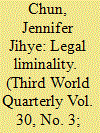

|
|
|
|
|
| Publication |
2009.
|
| Summary/Abstract |
Irregular employment (bij[ocheck]nggyujik) has become the dominant form of employment in South Korea, with upwards of 70% of women employed in this sector. This transformation has not only affected the demographics of the labour market, but it has also fundamentally reshaped how unions can organise workers and build collective power. In particular, irregular workers are faced with a state of legal liminality in which workers are neither fully protected by nor fully denied the rights of formal employment, resulting in classification struggles over the terms and conditions of irregular employment. Drawing from recent cases, this paper discusses the limits of masculinised forms of labour militancy and the prospects for developing more inclusive forms of unionism across gender and employment status. Interrogating how workers and their collective organisations are challenging the 'legal liminality' associated with downgraded forms of irregular employment is crucial for understanding the new dynamics of economic marginality and social exclusion in Korea as well as in the broader global economy.
|
|
|
|
|
|
|
|
|
|
|
|
|
|
|
|
| 6 |
ID:
124640
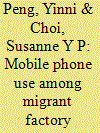

|
|
|
|
|
| Publication |
2013.
|
| Summary/Abstract |
Comparing ethnographic and interview data in three contrasting production arrangements in a labour-intensive factory in South China, this article argues that while the mobile phone constitutes a new contested terrain on the shop floor and facilitates control and resistance between capital and labour simultaneously, the dynamics of control and resistance is contingent upon the exact arrangements of production. While the management strictly prohibit line operators in the assembly line department from using their mobile phones, they turn a blind eye towards mobile phone use among workers in the hardware department, and mandate mobile workers who are not fixed at work stations in both departments to use mobile phones. Diverse managerial control tactics have generated different patterns of worker resistance. Workers in the assembly line department employ strategies to evade managerial surveillance and continue to use mobile phones at work covertly. They also contest the double standards of mobile phone use displayed by the management. Workers in the hardware department challenge the boundaries of legitimate mobile phone use, and mobile workers use tactics to escape being tracked down by the management via their mobile phones. Mobile phones also facilitate the strategy of resistance through exit among all workers.
|
|
|
|
|
|
|
|
|
|
|
|
|
|
|
|